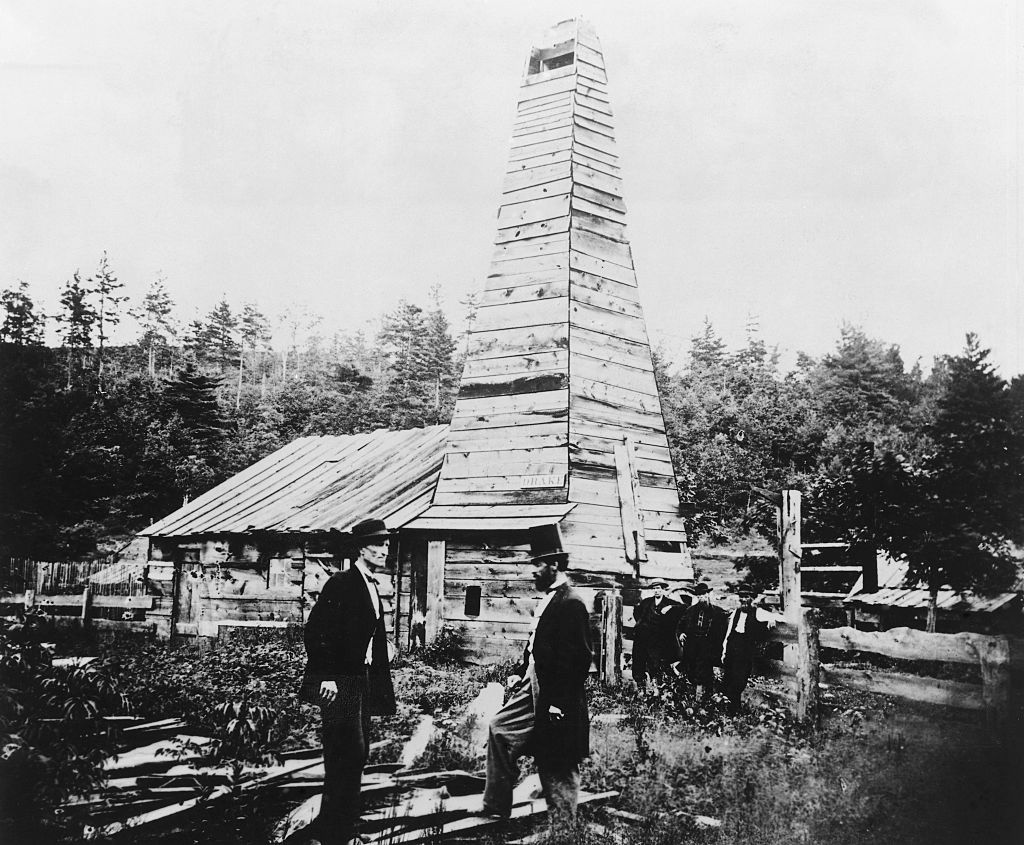
Get the latest financial news, insights and expert analysis from our award-winning MoneyWeek team, to help you understand what really matters when it comes to your finances.
You are now subscribed
Your newsletter sign-up was successful
Want to add more newsletters?

Twice daily
MoneyWeek
Get the latest financial news, insights and expert analysis from our award-winning MoneyWeek team, to help you understand what really matters when it comes to your finances.

Four times a week
Look After My Bills
Sign up to our free money-saving newsletter, filled with the latest news and expert advice to help you find the best tips and deals for managing your bills. Start saving today!
Until about 150 years ago, one of the main sources of oil for purposes such as lighting, was whales. People had been collecting “rock oil” from seeps, where it oozes to the surface, for centuries. Unfortunately for the whales, however, scooping it up from the ground wasn't commercially viable.
In efforts to get at the stuff in more commercial quantities, oil wells had been sunk in Poland and Canada. But these were hand-dug affairs. In 1848, a well was drilled in Azerbaijan by Russian engineer FN Semyenov, considered by many to be the first modern-drilled oil well. But it would be Edwin Drake that would have the biggest and most immediate effect on the industry in the USA.
With the backing of the Seneca Oil Company, Drake used new techniques (which he neglected to patent) using an iron pipe to drill a comparatively deep well through the bedrock in Titusville, Pennsylvania. And on this day in 1859, at a depth of 69 feet, he struck oil. His pioneering well produced 25 barrels of oil a day.
MoneyWeek
Subscribe to MoneyWeek today and get your first six magazine issues absolutely FREE

Sign up to Money Morning
Don't miss the latest investment and personal finances news, market analysis, plus money-saving tips with our free twice-daily newsletter
Don't miss the latest investment and personal finances news, market analysis, plus money-saving tips with our free twice-daily newsletter
It wasn't all plain sailing for Drake, however. He had spent five months perfecting his drilling method. And soon after production began, his chief driller sparked disaster when he went to inspect the well one dim day, using an oil lamp to light his way. The oil inevitably ignited, and burned down the well buildings and Drake's house.
But Drake's well proved that it was economically feasible to extract oil from the ground, and his success sparked a boom. Imitators sprung up all around the immediate area. And within 13 years, they were producing some 16,000 barrels a day.
Many people got humongously rich. But not Drake; he ended up broke. He only drilled three wells in total, and lost an awful lot of money speculating in oil. But the grateful people of Titusville granted him a stipend, and in 1876, the state of Pennsylvania awarded him a pension.
Get the latest financial news, insights and expert analysis from our award-winning MoneyWeek team, to help you understand what really matters when it comes to your finances.

-
 Should you buy an active ETF?
Should you buy an active ETF?ETFs are often mischaracterised as passive products, but they can be a convenient way to add active management to your portfolio
-
 Power up your pension before 5 April – easy ways to save before the tax year end
Power up your pension before 5 April – easy ways to save before the tax year endWith the end of the tax year looming, pension savers currently have a window to review and maximise what’s going into their retirement funds – we look at how
-
 What's behind the big shift in Japanese government bonds?
What's behind the big shift in Japanese government bonds?Rising long-term Japanese government bond yields point to growing nervousness about the future – and not just inflation
-
 Halifax: House price slump continues as prices slide for the sixth consecutive month
Halifax: House price slump continues as prices slide for the sixth consecutive monthUK house prices fell again in September as buyers returned, but the slowdown was not as fast as anticipated, latest Halifax data shows. Where are house prices falling the most?
-
 Rents hit a record high - but is the opportunity for buy-to-let investors still strong?
Rents hit a record high - but is the opportunity for buy-to-let investors still strong?UK rent prices have hit a record high with the average hitting over £1,200 a month says Rightmove. Are there still opportunities in buy-to-let?
-
 Pension savers turn to gold investments
Pension savers turn to gold investmentsInvestors are racing to buy gold to protect their pensions from a stock market correction and high inflation, experts say
-
 Where to find the best returns from student accommodation
Where to find the best returns from student accommodationStudent accommodation can be a lucrative investment if you know where to look.
-
 The world’s best bargain stocks
The world’s best bargain stocksSearching for bargain stocks with Alec Cutler of the Orbis Global Balanced Fund, who tells Andrew Van Sickle which sectors are being overlooked.
-
 Revealed: the cheapest cities to own a home in Britain
Revealed: the cheapest cities to own a home in BritainNew research reveals the cheapest cities to own a home, taking account of mortgage payments, utility bills and council tax
-
 UK recession: How to protect your portfolio
UK recession: How to protect your portfolioAs the UK recession is confirmed, we look at ways to protect your wealth.
